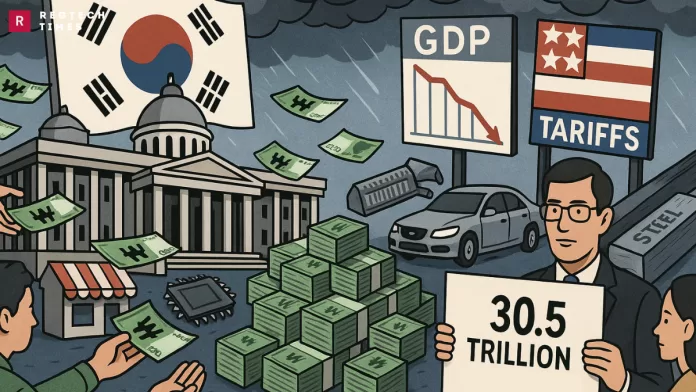South Korea has announced a new extra budget of 30.5 trillion won, or about $22.2 billion, to fight a worsening economic slowdown. The plan was revealed by the Ministry of Economy and Finance shortly after President Lee Jae Myung took office earlier this month. Lee had promised more than 30 trillion won in fresh spending to boost growth and support small businesses. This latest move brings the total supplementary budgets this year to over 44 trillion won, including an earlier 13.8 trillion won package approved before the election.
Out of the new 30.5 trillion won budget, 15.2 trillion won will be used for general economic stimulus. Another 5 trillion won is aimed at helping everyday people, especially small business owners. The remaining 10.3 trillion won will cover a revenue shortfall, as the government is collecting less in taxes than expected.
The country’s tax income has dropped because businesses are making less money and people are spending less. This is happening just as the economy faces pressure from new trade barriers and a loss of consumer confidence.
Trade Tensions and Economic Pain Deepen
South Korea’s economy shrank in the first quarter of the year, showing signs of serious trouble. In response, the Bank of Korea lowered its growth forecast for 2025 from 1.5% to just 0.8%. The bank also cut interest rates to 2.5% to encourage more borrowing and spending.
BOK Governor Rhee Chang-yong had already warned earlier this year that more fiscal help would likely be needed in 2025. Now, that prediction is becoming reality.
One major reason for the economic trouble is the impact of rising US tariffs. Former US President Donald Trump has planned across-the-board tariffs on South Korean goods, with rates jumping to 25% in July from 10%. These tariffs are among the highest ever placed on a US ally and directly affect South Korea’s exports — which make up more than 40% of the entire economy.
The country’s top export sectors like semiconductors, automobiles, steel, and aluminum are all in the firing line. As a result, South Korea is seeing a big drop in corporate tax and value-added tax (VAT) income. Of the 10.3 trillion won tax gap, nearly 9 trillion won comes from those two sources alone.
The situation is made worse by recent political turmoil. Former President Yoon Suk Yeol left behind a shaky political environment after a failed attempt to declare martial law, which further disrupted public confidence and economic stability.
Financing the Budget
To pay for the extra spending, the government is using several methods. About 5.3 trillion won will come from adjusting existing spending plans. Another 2.5 trillion won will be taken from leftover money in public funds. A further 3 trillion won will be sourced from changes to how foreign exchange stabilization bonds are handled.
The largest part — 19.8 trillion won — will be raised by selling new government bonds. That means the government will borrow money from investors and promise to repay it later. Because of this borrowing, South Korea’s debt-to-GDP ratio will climb to 49% in 2025, up from 47.4% last year. Total government spending will rise by 6.9%, according to the Finance Ministry.
Vouchers, Debt Concerns, and Political Pushback
As part of the economic stimulus, the government plans to distribute consumer vouchers worth between 150,000 and 500,000 won per person. These payments will go to the general public, not just selected groups. The goal is to get people to spend money quickly to help businesses. Also, regional gift certificate programs will be expanded to push more spending in local areas.
Second Vice Minister of Finance Lim KiKeun said during a press briefing, “Bold and timely fiscal support is essential for the economy to return to a solid upward trajectory. While the supplementary budget cannot solve all challenges at once, it represents the first crucial step forward.”
However, not everyone agrees. Song Eon-seog, a lawmaker from the conservative People Power Party, warned that this large and fast-paced spending could actually hurt the economy instead of helping it. He referred to the plan as a “reckless extra budget” and raised concerns about the rising debt levels.
Despite these concerns, the Bank of Korea has supported the idea of fast and targeted spending to improve domestic demand. The central bank noted that the inflation risk from this stimulus would be low.
